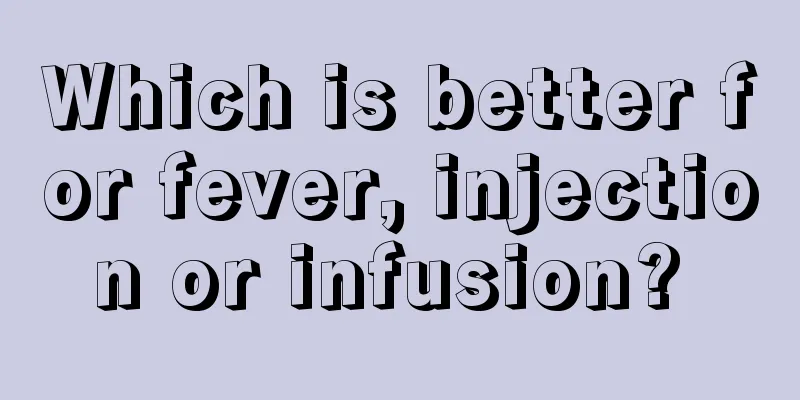Which is better for fever, injection or infusion?

|
Fever is the most common symptom in life and can cause serious damage to people's bodies. This is because fever is a phenomenon in which the body's internal defense mechanism is activated, which will consume most of the body's vitality. Severe fever can damage the brain and cause irreversible damage. There are many treatments for fever, among which injections and infusions are the most common. Let’s take a look at which is better for fever: injections or infusions? Fever is just a symptom. Whether to get an injection, infusion, or take medicine depends on what disease causes the fever. Generally, if you want to reduce fever simply, you need to take some antipyretics. The commonly used ones in clinical practice now are acetaminophen or ibuprofen. Before a clear diagnosis is made, do not blindly give infusions or injections. Even hospitals with benign diseases will not give infusions to patients casually. People have regarded intravenous infusion as the most effective treatment method and choose infusion for both major and minor illnesses. In fact, inappropriate infusion can lead to very serious consequences and even be life-threatening. Even for common colds, fevers, and diarrhea, many people ask doctors to give them intravenous infusions, believing that infusions can quickly improve their conditions and treating intravenous infusions as an omnipotent "life-saving straw." Many people now have misunderstandings about intravenous infusion. Many patients often say that intravenous infusion can increase the body's absorption rate of drugs, so the disease will heal faster. Now most patients who go to the hospital for treatment ask the doctor to give them intravenous infusion, believing that only intravenous infusion can make the disease heal faster. The harm of excessive infusion is quite serious. Generally, it can be treated with medication or intramuscular injection. Most people may have the same understanding of infusion as Ms. Wu. This is due to a lack of medical knowledge and is also a misunderstanding of most people. It is undeniable that the intravenous infusion method reduces the damage of gastric acid to drugs and has a more direct effect, especially for patients with stomach problems and high fever. However, intravenous infusion does not cure the disease as some people imagine. On the contrary, intravenous infusion has greater risks than oral medication. Because infusion requires sterile operation, especially intravenous infusion, the environment must be clean, otherwise the bacteria and pathogenic microorganisms in the atmosphere will contaminate the puncture site and the infused fluid, causing adverse reactions in the patient. |
<<: How to use Platycladus orientalis leaves to treat seborrheic alopecia
>>: Treatment methods for severe mental disorders
Recommend
Will nasopharyngeal cancer cause throat pain in the early stage? What medicine should I take?
Pharyngeal pain may occur in the early stages of ...
What is the formula for the order of meridian circulation
As we all know, meridians are of vital importance...
7 tips to deal with dry eyes
What should we do if our eyes are dry? Although o...
Being too honest, what caused it
People have different personalities. They are not...
The relationship between blood sugar and urine sugar
Blood sugar is the sugar that participates in the...
Hand-warming mouse, the advantages of hand-warming mouse
Many people are familiar with hand-warming mouse....
What's wrong with just farting but no poop
Everyone's gastrointestinal diseases are diff...
How to delay menopause and prevent early menopause
Menopause is something that middle-aged women are...
How to tell whether honey is real or fake?
As we all know, honey is not only rich in nutrien...
Is brainstem encephalitis serious?
Most children are prone to encephalitis when they...
How much does bone cancer curative surgery cost?
How much does bone cancer surgery cost? This is a...
What tests should be done for kidney cancer?
The main complaints and clinical manifestations o...
Is borosilicate glass toxic?
Borosilicate glass is non-toxic. It is mainly mad...
Do I need to avoid certain foods if I have skin allergies?
Skin allergy is a common skin disease. There are ...
How much does radiotherapy for prostate cancer cost?
How much does radiotherapy for prostate cancer co...









